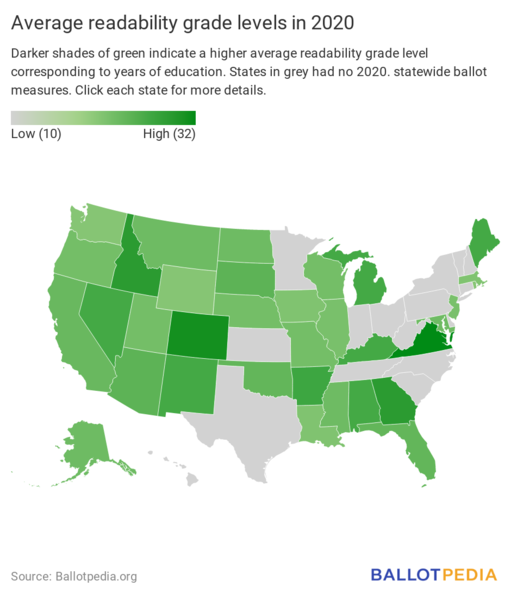2020 ballot measure readability analysis: ballot language is written at an average reading grade level of 17 (first-year graduate school), down from between 19 and 20 in 2018
The average statewide ballot measure in 2020 is written at a reading grade level of 17, similar to the reading level in first-year graduate school. The 2020 reading level is down from between 19 and 20 in 2018, according to Ballotpedia's annual analysis of the readability of ballot language for the 128 statewide measures across 34 states in 2020.
Below are some of the highlights of the report.
• The average Flesch-Kincaid Grade Level for the ballot titles (ballot questions) of all 128 statewide 2020 ballot measures was about 17.
• The average ballot title grade for all measures in a single state averaged together ranged from 10 in Rhode Island, Washington, and Wyoming to 32 in Virginia.
• In 2018, the average Flesch-Kincaid Grade Level for ballot titles was between 19 and 20, and average state scores ranged from eight to 42.
• Ballotpedia identified 67 measures with a ballot summary that was set to appear alongside the ballot question on the ballot. The average Flesch-Kincaid Grade Level for the ballot summaries was about 14.
• The average ballot summary grade for all measures in a single state averaged together ranged from 10 in Louisiana and Maryland to 20 in Arkansas.
• The average ballot title grade was highest for ballot titles written by state legislatures (19) and other state boards and offices (18).
• Initiative proponents wrote the ballot language for eight of the measures (in some cases, with help from state officials). The average ballot title grade for those measures was 15.
• Attorneys general wrote titles with the lowest average grade level of 14.
• The average ballot title in 2020 contained about 60 words. In 2018, the average ballot title length was 66 words.
• The 2020 ballot measure with the longest ballot title was Colorado Proposition 118 concerning a paid family and medical leave program. The ballot question had 270 words.
• The states with the shortest ballot titles or questions on average were Florida, California, Iowa, and Alaska; all of these except Iowa did feature additional ballot summaries or explanations.
Additional readings:



